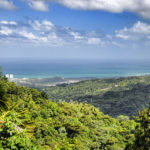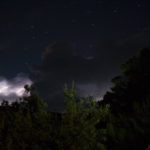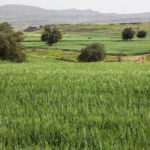
Les Amazones d’Afrique is an impressive collective of female musicians from West Africa who are working towards ending gender inequality. The group includes Angélique Kidjo, Kandia Kouyaté, Mamani Keita, Mariam Doumbia, Mariam Koné, Massan Coulibaly, Mouneissa Tandina, Nneka, Pamela Badjogo, and Rokia Koné.
The name of the ensemble pays homage to both the Dahomey Amazons, women warriors who protected West African borders for nearly 200 years, and Les Amazones de Guinée, the first all-female music group in Guinea. Unlike Les Amazones de Guinée, who sing and play their own instruments, Les Amazones d’Afrique enlist the help of producer Liam Farrell, aka Doctor L, to arrange the music. The songs are sung in English, French, Bambara, and Fon over a psychedelic dub funk that often embodies a modern, industrial edge.
République Amazone will split listeners. On one hand, the adventurous, contemporary approach utilizing samples and effects in a psychedelic, funky dub that is heavily influenced by the producer will appeal to those who are looking for something different. On the other hand, the production takes over the mix, which in turn often marginalizes the vocalists who are the stars of the project. Either way, the voices and the music sometimes sound disconnected, like they don’t naturally fit together. The lack of live instruments throughout much of the album adds to this aural distance. The backing arrangements, while interesting at times, rarely resolve into anything more than a groove, which makes the music sound generic. The tracks that include guitar, ngoni, or kora offer more authenticity.
Angélique Kidjo kicks off the record with “Dombolo,” revealing her strong presence over a throbbing, synthesized loop with a shuffling rhythm. Kidjo’s voice floats in and out of the mix, which works well with the backing accompaniment, but the music doesn’t resolve and becomes repetitive quickly.
“Mansa Soyari” features some amazing lead vocals courtesy of Rokia Koné. Unfortunately her voice is veiled behind a distorted filter, adding an unnecessary distraction. The music is a basic blues uplifted by Mamadou Diakité’s guitar playing and Kone’s brilliant, albeit manipulated voice.
Mamani Keita sings on “Doona,” a catchy slice of dub funk with some great electric piano and guitar that draws the listener in. Keita’s voice makes the track even though it’s also distorted and the song doesn’t end up going anywhere.
Luckily, “La Dame et Ses Valises” puts Nneka’s excellent, smoky voice to the front of the mix. She injects a heavy dose of soul and tenacity into the song. While the backing accompaniment is catchy at first, it ends up being a pieced together jam. “Nebao” features Mamani Keita over some laid-back funk with a rolling bassline and Diakité’s fuzzy guitar. Keita’s voice shifts from understated to fiery within moments in a fine performance.
Rokia Koné and Massan Coulibaly’s voices ring out front and center on “Deep in Love,” a sultry slow dub bathed in wah-wah guitar. “Aniskoma” is arguably the standout track on the album. Here Rokia Koné and Kandia Kouyaté reign supreme over a track with ngoni and percussion, which gives it a much more natural feel. The lead vocals are straight forward and the contrasting voices glow over this pulsing blues.
“Wedding” is a rolling groove that pushes Madiaré Diamé’s lead vocals into the background with heavy distortion, while the clean backing vocals take the front spot. While the effect attempts to add grit to the track, it ends up being a frustrating choice.
“Kounani” features Madina N’Diaye’s sweet vocals over an uplifting, funky tune. Her kora playing adds a lot of texture to the song. “Full Moon” delivers more psychedelic wah-wah funk with Rokia Koné and Mamani Keita’s lead vocals behind an annoying filter that sounds like a radio signal fading in and out.
“I Play the Kora” is an engaging groove made more haunting by the lead vocals from Rokia Koné, Mamani Keita, Nneka, Kandia Kouyaté and Mariam Doumbia. The backing track is filled with some interesting samples and a sawing cello which adds to the mystique.
“Desert Storm” is a great closer. Kandia Kouyaté and Rokia Koné are outstanding here, their voices commanding the airwaves with grace over a slow blues enhanced by ngoni.
The vocalists shine all over this record, but the added distortion and filters on the lead vocals are disappointing. This ambitious project features divine performances from some of Africa’s greatest vocalists, but the production does them few favors and ultimately the music is a let down, making République Amazone a missed opportunity.
Originally published in RootsWorld Magazine.
https://vimeo.com/200333634




Be First to Comment